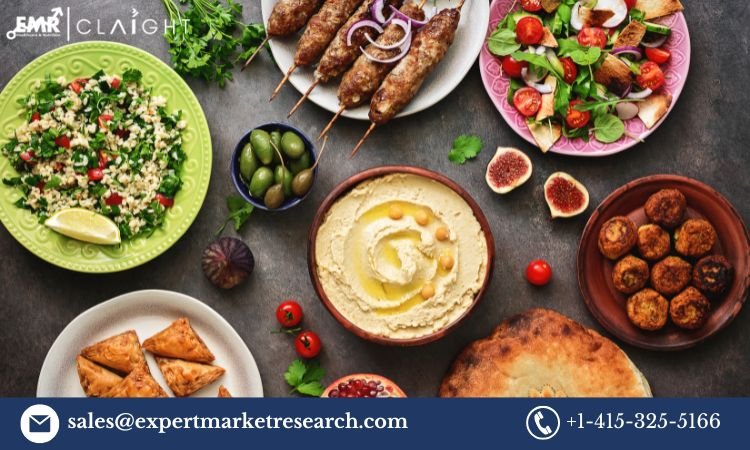The halal food market has gained substantial momentum in recent years, fueled by a growing consumer base in both Muslim-majority regions and non-Muslim countries. In 2024, the halal food market attained a market value of USD 2.23 trillion and is expected to grow at a CAGR of 16.50% during the forecast period of 2025-2034. By 2034, the halal food market is projected to reach a staggering value of USD 10.27 trillion. This robust growth is driven by increasing awareness about halal dietary standards, a rising Muslim population, and increasing demand for quality-certified food products. In this article, we will delve into the overview of the halal food market, its size and share, market dynamics, growth drivers, market opportunities and challenges, and a competitor analysis.
Overview of the Halal Food Market
The halal food market refers to the production, distribution, and sale of food products that comply with halal standards defined by Islamic dietary laws. Halal food is free from any ingredients or processes that are considered haram (forbidden), such as pork or alcohol. Halal food encompasses a wide range of products, including meat, beverages, dairy, snacks, and ready-to-eat meals.
The demand for halal food products has witnessed exponential growth, not only due to religious adherence but also because of the increasing acceptance of halal products among non-Muslim populations who perceive them as high-quality, safe, and ethically produced.
One of the driving factors is the global Muslim population, which is expected to increase significantly over the next decade. In addition to this, halal food certification has been gaining widespread recognition, which assures consumers of the quality and integrity of the food they are consuming.
Size & Share of the Halal Food Market
The halal food market is a rapidly growing sector in the global food industry. In 2024, the halal food market reached a market value of USD 2.23 trillion. As the halal food sector continues to evolve, the demand for halal-certified food products is set to grow across all regions.
Market Segmentation
- By Product Type:
- Meat & Poultry: The meat and poultry segment is one of the largest contributors to the global halal food market. Halal meat, especially beef, lamb, and chicken, is in high demand across various regions, particularly in Muslim-majority countries.
- Dairy Products: Halal dairy products, including milk, cheese, and yogurt, are growing in popularity as more consumers seek certified halal options in their daily diet.
- Snacks & Beverages: The snacks and beverages segment is seeing a surge in demand for halal-certified products, including chips, biscuits, soft drinks, and juices.
- Ready-to-Eat Meals: With a fast-paced lifestyle, the demand for halal-certified ready-to-eat meals is increasing. These include frozen meals, packaged foods, and convenient options.
- Confectionery: Halal-certified chocolates, candies, and other sweets are also witnessing growth as demand increases from non-Muslim and Muslim populations alike.
- By Distribution Channel:
- Supermarkets/Hypermarkets: Supermarkets and hypermarkets play a key role in distributing halal food products. Major chains are expanding their halal offerings to cater to the rising demand.
- Online Retail: The growth of e-commerce has facilitated the availability of halal food products through online platforms, offering convenience and a wider range of products for consumers.
- Specialty Stores: Halal food specialty stores are increasingly popular in both Muslim-majority and non-Muslim countries. These stores provide a one-stop-shop for a variety of halal-certified products.
- By Geography:
- Middle East & Africa: This region has a high demand for halal food products due to the large Muslim population. The Middle East and North Africa (MENA) region is one of the largest consumers of halal products.
- Asia Pacific: The Asia Pacific region, especially countries like Indonesia, Malaysia, and Pakistan, is witnessing a rapid increase in demand for halal food, driven by a growing Muslim population.
- Europe: Europe is experiencing a rise in demand for halal food, particularly in countries such as the UK, France, and Germany, which have significant Muslim populations.
- North America: North America is a key region for the growth of the halal food market, driven by the increasing Muslim population and rising consumer awareness about halal-certified products.
Market Dynamics & Trends
The halal food market is shaped by several dynamics and trends that contribute to its growth. The key drivers include changing consumer preferences, population growth, and increasing acceptance of halal certification among non-Muslim consumers.
Key Market Drivers
- Rising Muslim Population: The global Muslim population is expected to grow at a rapid pace, which directly influences the demand for halal food products. According to studies, by 2030, nearly 25% of the world’s population will be Muslim, leading to a significant increase in halal food consumption.
- Growing Demand for High-Quality, Ethical Food: Halal food products are perceived to be of higher quality, safer, and produced under ethical standards. As consumers become more health-conscious and concerned about food safety, the demand for halal-certified food is rising.
- Halal Certification Recognition: Halal certification bodies are becoming more recognized worldwide, ensuring that halal food standards are maintained. This certification not only attracts Muslim consumers but also appeals to non-Muslim consumers who trust the quality of certified food.
- Increasing Awareness and Acceptance in Non-Muslim Countries: Halal food products are being increasingly accepted in non-Muslim countries, especially in Europe and North America, where there is growing awareness of the benefits and ethical practices associated with halal food.
- Ethical Consumption and Animal Welfare: Halal slaughtering methods, which emphasize animal welfare and ethical practices, are gaining favor among conscious consumers, making halal food appealing to a broader audience beyond the Muslim population.
Emerging Trends
- Plant-Based Halal Products: With the rise of plant-based and vegan diets, there is a growing trend for plant-based halal products. These products cater to both Muslim consumers and the expanding health-conscious demographic seeking halal-certified plant-based foods.
- Halal Food for the Health-Conscious: Halal food products are increasingly being marketed as healthy and nutritious. With a growing focus on organic, gluten-free, and low-fat halal food options, the market is catering to the health-conscious demographic.
- Halal Food for Export Markets: As demand for halal food products rises globally, countries such as Turkey, Malaysia, Indonesia, and Pakistan are capitalizing on export opportunities. Halal food products are increasingly being exported to regions like Europe and North America, where demand for such products is rising.
- Technological Advancements in Halal Food Production: Advances in food production technology, including new packaging methods, are allowing for better preservation of halal products, which increases their shelf life and quality.
Get a Free Sample Report with a Table of Contents:
http://expertmarketresearch.com/reports/halal-food-market/requestsample
Growth of the Halal Food Market
The halal food market is expected to experience significant growth, with a CAGR of 16.50% during the forecast period from 2025 to 2034. This growth can be attributed to several factors, including rising demand from both Muslim-majority and non-Muslim regions, increased awareness about halal food, and the expansion of halal-certified products across various food categories.
Factors Driving Market Growth
- Urbanization and Changing Lifestyles: The shift toward urban living and busy lifestyles is driving the demand for convenience food, such as ready-to-eat meals and snacks. Halal food producers are capitalizing on this trend by offering a range of halal-certified, ready-to-eat products.
- Retail Expansion: Large supermarket chains and online retailers are increasingly stocking halal products, making them more accessible to consumers worldwide. The expansion of halal food offerings in mainstream retail stores is helping to increase market penetration.
- Evolving Consumer Preferences: As consumers are becoming more conscious about food sourcing, ethical practices, and health benefits, they are choosing halal food products over non-halal alternatives. The broader acceptance of halal certification is expanding market potential.
Market Opportunities and Challenges
Opportunities:
- Emerging Markets in Asia Pacific and Africa: The Asia Pacific and Africa regions offer significant growth opportunities for halal food companies due to rising disposable incomes, urbanization, and increasing demand for halal food products.
- Expansion into Non-Muslim Countries: As non-Muslim countries experience growing demand for halal products, companies have the opportunity to expand their market reach and tap into a broader consumer base.
- Innovative Product Development: Companies can innovate by introducing plant-based halal products, halal-certified snacks, and ready-to-eat meals to meet the needs of the evolving consumer market.
Challenges:
- Regulatory Challenges: Halal certification requirements and regulations may differ from country to country, making it difficult for companies to navigate the complexities of international certification standards.
- Supply Chain Issues: Ensuring the traceability of halal products and maintaining halal certification throughout the supply chain can be challenging for manufacturers and retailers.
- Cultural and Religious Barriers: Halal food companies must consider cultural sensitivities and religious practices in different regions when marketing and distributing products.
Competitor Analysis
Key players in the halal food market are leading the way by offering a wide range of halal-certified products that cater to diverse consumer needs. Some of the major players include:
- Nestlé :Nestlé offers a wide range of halal-certified food products across various categories such as dairy, beverages, and ready-to-eat meals.
- Unilever :Unilever is a global leader in halal food products, offering halal-certified brands such as Lipton, Knorr, and Magnum.
- BRF S.A. :BRF is one of the largest halal food producers globally, specializing in halal meat and poultry products distributed worldwide.
- Al Islami Foods :Al Islami Foods is a leading halal food brand offering a wide range of products, including frozen foods, snacks, and ready-to-eat meals, catering to Muslim consumers globally.
- Cargill :Cargill produces and distributes halal-certified meat and food products, focusing on meeting the growing demand for halal options in both Muslim and non-Muslim regions.
Explore our trending Blogs and Reports :
Top Construction Companies
HVAC Variable Frequency Drive Market



